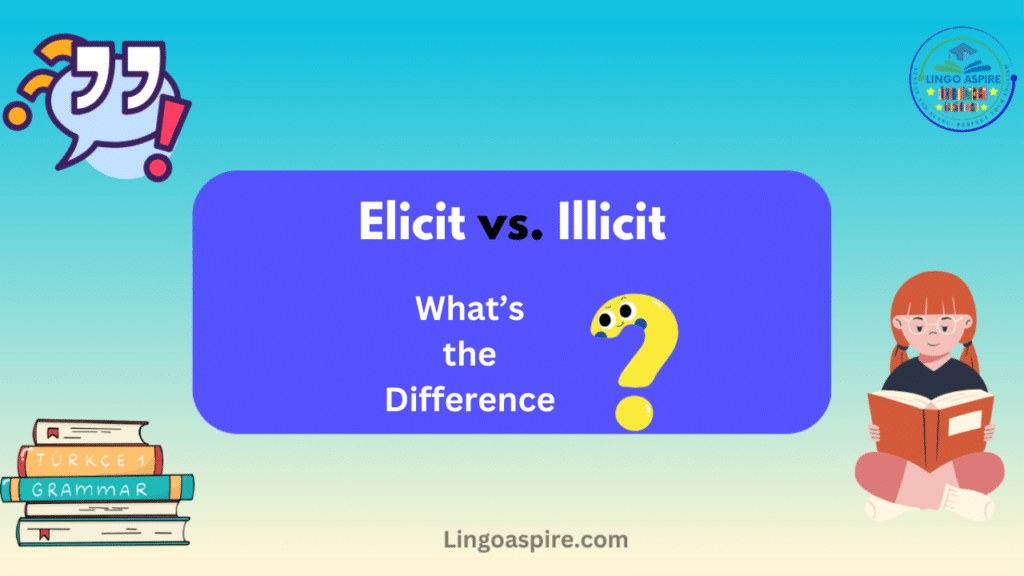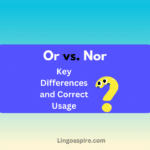Many people confuse elicit vs. illicit because they sound almost the same. However, they have completely different meanings. Knowing the difference between elicit and illicit is important, especially in writing and conversations. One refers to drawing out a response, while the other means something illegal.
This article explains what elicit means, what illicit means, their definitions, examples, and synonyms, and how to use elicit and illicit correctly. You will also find memory tricks and a comparison table to help you remember them.
Quick Summary: Elicit vs. Illicit

Elicit is a verb that means to draw out, obtain, or provoke a response. Example: The teacher tried to elicit answers from the students.
Illicit is an adjective that means forbidden, illegal, or against the rules. Example: The police arrested him for his illicit activities.
Below is a quick comparison table:
| Word | Part of Speech | Meaning | Example Sentence |
|---|---|---|---|
| Elicit | Verb | To draw out a response or information | The speech elicited strong emotions. |
| Illicit | Adjective | Forbidden, illegal, or against the law | He was involved in illicit drug trade. |
Understanding the difference between elicit vs illicit can help avoid mistakes in writing.
What Does Elicit Mean?
The elicit definition is to bring out, provoke, or obtain a response, feeling, or information. It is always a verb and is used when someone is trying to get an answer or reaction.
Elicit pronunciation
Elicit is pronounced as /ɪˈlɪsɪt/ (ih-LIS-it).
How to Use Elicit
The word elicit is often used when asking questions or provoking reactions. For example, a journalist may try to elicit a response from a politician. A joke can elicit laughter.
Here are some elicit vs illicit examples with “elicit”:
- The lawyer’s question elicited an emotional response from the witness.
- Her speech elicited a standing ovation.
- The teacher’s explanation elicited curiosity among the students.
- The detective tried to elicit information from the suspect.
Elicit Synonym
Some synonyms include:
- Evoke
- Extract
- Draw out
- Obtain
- Bring out
- Generate
What Does Illicit Mean?
The illicit definition is forbidden by law, rules, or customs. It is always an adjective and refers to something illegal or morally wrong.
Illicit Pronunciation
Illicit is pronounced as /ɪˈlɪsɪt/ (ih-LIS-it), the same as “elicit.”
How to Use Illicit
The word illicit is used when something is illegal, prohibited, or morally unacceptable. For example, illicit activities include drug trafficking, smuggling, and corruption.
Here are some elicit vs illicit examples with “illicit”:
- The police arrested him for illicit activities.
- The company was shut down due to illicit trade.
- He was caught in an illicit affair.
- The smuggler was involved in illicit weapons sales.
Illicit Synonym
Some illicit synonyms include:
- Illegal
- Unlawful
- Prohibited
- Banned
- Unlicensed
- Forbidden
Key Differences Between Elicit vs. Illicit

Many people confuse elicit and illicit because they sound identical, but their meanings are completely different. Below is a detailed breakdown of their key differences:
| Feature | Elicit | Illicit |
|---|---|---|
| Part of Speech | Verb | Adjective |
| Definition | To draw out, bring forth, or obtain a response, reaction, or information | Forbidden by law, rules, or morality; illegal or prohibited |
| Usage Context | Communication, psychology, education, journalism, and legal questioning | Crime, law, ethics, morality, and forbidden activities |
| Example Sentence | The teacher tried to elicit answers from the students. | The police arrested him for illicit activities. |
| Synonyms | Evoke, extract, provoke, obtain, generate | Illegal, unlawful, prohibited, forbidden, banned |
| Pronunciation | /ɪˈlɪsɪt/ (ih-LIS-it) | /ɪˈlɪsɪt/ (ih-LIS-it) |
| Common Mistakes | Confusing it as an adjective (it is always a verb) | Mistaking it as a verb (it is always an adjective) |
| Memory Trick | Elicit sounds like Evoke – both mean bringing something out | Illicit starts with “Il” – think of “Illegal” or “Ill” behavior |
By understanding these differences, you can confidently use elicit and illicit correctly in writing and speech.
Elicit vs. Illicit: American vs. British English Usage
The words elicit and illicit maintain the same meanings and usage in both American and British English. However, there are subtle differences in their frequency and context of use between these two variants of English.
1. Elicit in American vs. British English
- In American English, journalists, law enforcement officers, and psychologists more often use “elicit” to describe obtaining a response or reaction.
- Example: The detective tried to elicit a confession from the suspect.
- In British English, elicit is frequently used in academic and formal discussions, often relating to education or logical arguments.
- Example: The professor’s question elicited a thoughtful discussion among students.
2. Illicit in American vs. British English
- In American English, people strongly associate “illicit” with criminal activities, particularly illegal drugs, smuggling, or fraud.
- Example: The authorities cracked down on illicit drug trade across the border.
- In British English, illicit is commonly used in moral or ethical contexts, such as affairs, gambling, or black-market transactions.
- Example: The newspaper exposed the politician’s illicit affair.
Spelling and Pronunciation Differences

- Spelling: There are no spelling differences between American and British English for “elicit” and “illicit.”
- Both words are pronounced /ɪˈlɪsɪt/ (ih-LIS-it) in American and British English.
While elicit vs illicit difference remains the same worldwide, understanding their contextual preferences can enhance your writing for different audiences.
Why the Spelling Difference Exists
The spelling difference between elicit and illicit comes from their distinct etymological origins. Although they sound the same, they come from different Latin roots, which explain their different meanings and usage.
1. Origin of “Elicit”
The word elicit comes from the Latin verb “elicere”, which is a combination of:
- “e-“ meaning “out”
- “lacere” meaning “to draw” or “to entice”
Thus, elicit means “to draw out” or “to bring forth” something, such as a response or information.
2. Origin of “Illicit”
The word “illicit” comes from the Latin adjective illicitus, which consists of in- (meaning “not”) and licitus (meaning “lawful” or “permitted”).
- “in-“ meaning “not”
- “licitus” meaning “lawful” (related to “license” or “legitimate”)
So, illicit means “not lawful” or “forbidden by law”, making it synonymous with illegal or prohibited actions.
Why Do These Spelling Differences Matter?
Since elicit is a verb (an action) and illicit is an adjective (a description), their spellings remained distinct in English to preserve their different grammatical roles. Understanding this history makes it easier to remember their meanings and avoid confusion.
Common Mistakes and How to Avoid Them

Many people confuse “elicit” and “illicit” because they sound the same but have completely different meanings. To avoid this mistake, remember:
- Elicit is a verb (action word) that means to bring out or provoke.
- Illicit is an adjective (descriptive word) that means illegal or forbidden.
Elicit vs Illicit Comparison Table
| Feature | Elicit | Illicit |
|---|---|---|
| Part of Speech | Verb | Adjective |
| Definition | To bring out or obtain something | Forbidden, illegal, or against rules |
| Example | The joke elicited laughter. | He was arrested for illicit activities. |
| Synonyms | Evoke, draw out, obtain | Illegal, prohibited, unlawful |
Memory Tricks to Remember the Difference
A simple way to remember the difference between elicit and illicit is to associate them with similar words:
- Elicit sounds like “evoke” – both mean to bring out something.
- Illicit starts with “ill” – think of “illegal” or “unlawful.”
Another trick:
- Elicit = Evoke (Both start with “E”)
- Illicit = Illegal (Both start with “Il”)
Frequently Asked Questions (FAQs)
1. What is the main difference between elicit and illicit?
The main difference is their part of speech and meaning. Elicit is a verb that means to bring out or obtain a response, while illicit is an adjective that describes something forbidden by law or rules.
2. Can “elicit” and “illicit” ever be used interchangeably?
No, they have completely different meanings. Elicit refers to drawing out information or reactions, while illicit refers to illegal or forbidden activities. Using them incorrectly can change the meaning of a sentence.
3. How can I remember the difference between elicit and illicit?
A simple trick is to remember: “Elicit” sounds like “evoke”, meaning to bring out a response. “Illicit” starts with “il-” like “illegal”, meaning something unlawful.
Conclusion
Understanding elicit vs illicit is simple when you remember their meanings and parts of speech. Elicit means to draw out a response, while illicit refers to something illegal. By using comparison tables, examples, and memory tricks, you can avoid confusion. Next time you see these words, you’ll know exactly how to use them correctly!
Sources
1. Grammarly: Their article on “Elicit vs. Illicit” provides clear definitions and usage examples.
2. LanguageTool: This resource offers a concise guide on the differences between these two words.
3. Writer’s Digest: Their “Grammar Rules” section delves into the distinctions between “elicit” and “illicit” with practical examples.







